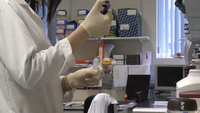Could sharing your medical records help save lives?

A damning report from the British Heart Foundation (BHF) has revealed how UK red tape is strangling medical research that could save lives and is calling on the NHS to open up its data.
The charity, which funds around £100m of medical research every year, is calling for the NHS to open up its data to the scientists it funds at universities and hospitals across the UK.
The report claims that researchers experience delays in gaining permission to access data, uncertainty about the rules governing the process of approval, and an overly complicated system that can slow potentially life-saving discoveries.
Survey figures by the BHF show the public is supportive of information from medical records being used in research. A YouGov poll found that more than three quarters (79%) of people would be happy for their doctor to share some level of medical information about them with health researchers to help develop new treatments.
Professor Peter Weissberg, Medical Director at the BHF, said: “Our NHS records are a source of potentially life-saving information and give us a unique opportunity to advance the prevention and treatment of heart disease. While data protection is clearly an important issue, the researchers we fund say they are caught up in unnecessary and inconsistently applied red tape that slows them down by months or even years, and costs them more in staff time and paperwork.”
Paul James, 54, a teaching consultant living in Alton near Stoke-on-Trent, who took part in a recent BHF research study, said: “I’m proof that research can be life-changing, so I fully support anything we can do to speed up future discoveries. I have a genetic type of heart failure, which means that without treatment I get breathless with even simple everyday tasks. Fortunately, researchers spotted me by looking at my medical records and I was invited to take part in a trial testing the use of an old drug for a new purpose. Whereas before I struggled to walk down the street without a pain in my arm, I’m now at the gym three times a week and best of all, I’m able to play properly with my daughter.
“I’d encourage everyone to support greater access to patient data for our scientists. It’s transformed my life, and could do the same for millions of others.”
The BHF says access to data in patients’ medical records is a crucial step towards saving more lives from heart and circulatory disease, which claims around 191,000 lives every year. The types of information that could help scientists make important breakthroughs include details about what medication patients take, what conditions they have been diagnosed with, or when and why they are admitted to hospital.
The BHF is calling for clear legal guidance for researchers, a single approval process to access patient data, and a workable system for using records to find patients to take part in trials for new treatments.
The survey also found that more than two thirds (70%) of UK adults were not aware that the type of information held in medical records has helped with the development of new treatments in the past. More than half (59%) were unaware that medical records could help lead to new treatments in the future.
One of the most important benefits of access to patient data is to pick up early signs of potentially important, unexpected side effects of drug treatments. Other research that relies on patient data includes the search for substances in the blood that could predict heart attack or stroke risk, and studies looking at whether widely used drugs, such as statins for high cholesterol, could be effective in wider patient groups, such as everyone over 50.
For more information and to download the full report, visit bhf.org.uk/patientdata


